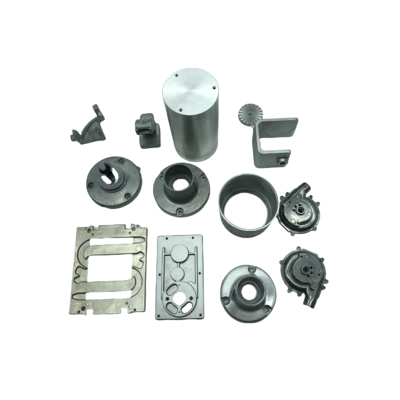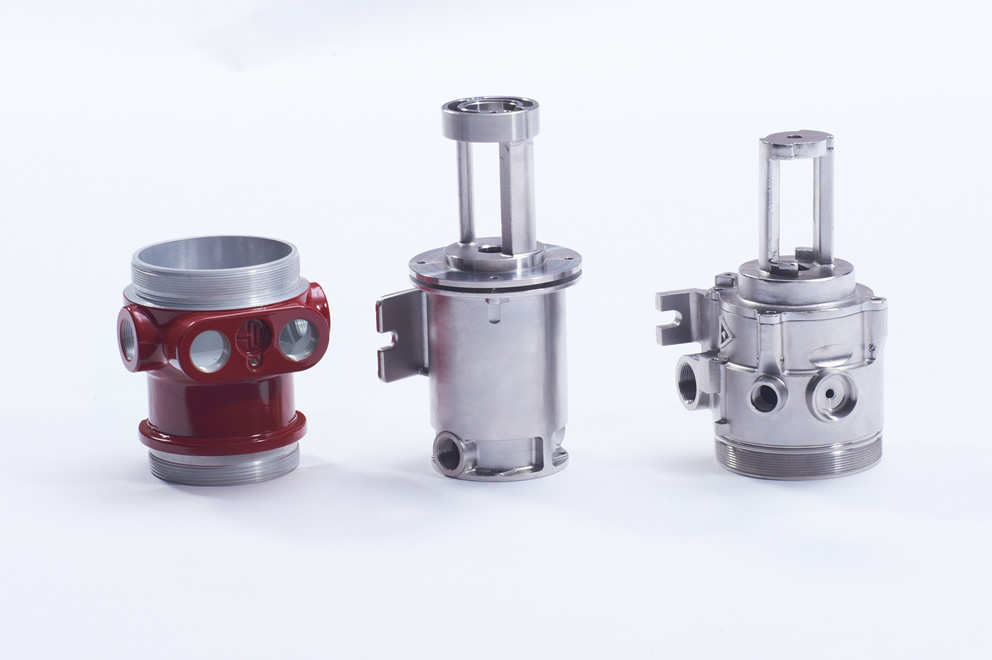How aluminum casting plays a major role in today’s manufacturing industry
The Future of Light Weight Aluminum Foundries: Advancements and fads Shaping the Sector
The aluminum shop industry is undertaking considerable change. Key patterns highlight the importance of sustainability and performance. Developments in smart production and automation are ending up being common. Foundries are increasingly concentrated on using recycled products. This shift questions concerning future methods and innovations. Exactly how will these modifications impact production techniques and market characteristics? The solutions may redefine the sector landscape in unforeseen means.
Developments in Smart Production Technologies
As the light weight aluminum foundry sector evolves, improvements in wise production technologies are ending up being increasingly essential for boosting performance and performance. The combination of automation, expert system, and the Internet of Things (IoT) is changing conventional shop procedures. These innovations make it possible for real-time surveillance of procedures, permitting immediate changes that optimize output and decrease waste.
Equipment understanding algorithms examine manufacturing information to recognize patterns and anticipate upkeep requirements, reducing downtime. Robotics are progressively used for repetitive jobs, releasing skilled workers to concentrate on more intricate challenges. In addition, digital doubles-- virtual versions of physical procedures-- promote simulations that can enhance design and functional approaches.
The adoption of these wise production modern technologies is driving competitive benefits in the light weight aluminum foundry market. By simplifying operations and enhancing decision-making abilities, factories can satisfy growing market needs while preserving top quality standards. The future of light weight aluminum shops is undoubtedly connected to these technical developments.
Accepting Eco-Friendly Products and Processes
The light weight aluminum shop industry is significantly concentrating on green products and procedures to enhance sustainability. This shift consists of the fostering of sustainable product sourcing, energy-efficient production techniques, and reliable recycling and waste management techniques. By integrating these techniques, foundries intend to reduce their ecological effect while preserving competitiveness in the market.
Lasting Material Sourcing
How can aluminum foundries improve their sustainability efforts? Lasting product sourcing has actually become an important strategy in accomplishing this goal. By focusing on recycled light weight aluminum, factories can significantly minimize their ecological footprint, as recycled materials need less energy and less resources compared to key light weight aluminum production. In addition, sourcing materials from certified suppliers that comply with environmentally friendly methods advertises responsible mining and reduces environmental influence. Shops are likewise checking out alternative products, such as biopolymers and green finishings, to complement standard light weight aluminum procedures. Working together with stakeholders, including suppliers and ecological companies, promotes advancement in sourcing strategies. Inevitably, embracing lasting material sourcing not only straightens with global sustainability goals but likewise placements light weight aluminum shops as leaders in eco responsible manufacturing.
Energy-Efficient Manufacturing Techniques
Light weight aluminum factories are progressively taking on energy-efficient manufacturing strategies to enhance their lasting material sourcing initiatives. These methods concentrate on reducing energy intake throughout the production process. Advanced innovations, such as induction melting and maximized spreading procedures, are being applied to decrease the total carbon impact. Furthermore, automation and wise production systems boost functional efficiency, enabling for far better power monitoring. Shops are also checking out the assimilation of renewable energy sources, such as solar and wind, to power their procedures. By prioritizing power effectiveness, aluminum factories not just lower production expenses but also straighten themselves with worldwide sustainability goals, making sure a more eco liable strategy to light weight aluminum production while fulfilling the increasing need for environmentally friendly practices in the sector.
Reusing and Waste Management
Accepting eco-friendly materials and processes, aluminum factories are prioritizing recycling and waste management methods to enhance sustainability in their procedures. By incorporating closed-loop systems, these centers are reducing waste and taking full advantage of resource performance. Scrap aluminum, an easily offered material, is being reused on-site, substantially reducing the need for virgin materials and reducing energy usage. Developments in arranging and refining technologies additionally help with the recycling of light weight aluminum, ensuring that even polluted materials can be repurposed properly. Additionally, factories are adopting lasting techniques such as decreasing dangerous waste and advertising making use of naturally degradable products for product packaging. This commitment to recycling not just decreases environmental impact however additionally boosts the financial viability of aluminum factories in an affordable market.
The Duty of Automation and Robotics
Automation and robotics are progressively changing the light weight aluminum foundry market, substantially improving production efficiency. By incorporating innovative innovations, foundries can lower labor expenses while concurrently enhancing safety and security requirements for their labor force. This shift not just simplifies operations yet likewise positions the industry for lasting development in an open market.
Improved Manufacturing Performance
Changing production procedures, the combination of sophisticated robotics and automation innovations has actually ended up being a keystone for aluminum shops looking for boosted effectiveness. These developments improve workflows, decrease cycle times, and enhance item high quality by decreasing human error. Automated systems can keep track of production lines in real-time, enabling instant modifications that enhance result. Additionally, robotics help with the handling of hazardous materials, guaranteeing much safer workplace while enhancing throughput. Predictive upkeep modern technologies additionally add to effectiveness by preparing for tools failures, consequently minimizing downtime. As a result, light weight aluminum factories can accomplish greater uniformity in their items while reacting extra quickly to market demands. This welcome of automation is establishing a new requirement for productivity and operational quality within the market.

Reducing Labor Prices
The shift in the direction of progressed robotics and automation in aluminum shops not only boosts production efficiency however likewise plays a considerable duty in decreasing labor costs. By incorporating automated systems, shops can lessen the reliance on manual work, which often entails high wages and training costs. Robotics simplify recurring tasks such as putting, molding, and ending up, enabling a greater outcome with fewer personnel. This technological change not only minimizes labor-related expenses however also improves consistency and top quality in production. Moreover, automation can operate all the time, optimizing operational hours without the associated prices of overtime or change differentials. Therefore, light weight aluminum factories can accomplish significant cost savings while preserving affordable prices in a progressing market landscape.
Improving Security Specifications
While conventional light weight aluminum shop procedures frequently subject workers to dangerous settings, the assimilation of robotics and automation considerably boosts safety and security criteria within the market. Automated systems can perform high-risk jobs, such as liquified steel handling and hefty lifting, reducing human exposure to hazardous problems. Furthermore, robotics can run in hazardous ambiences and severe temperature levels, successfully reducing the risk of injury. Advanced keeping track of technologies and expert system warranty real-time safety assessments, permitting immediate reactions to potential risks. Additionally, automation streamlines process, lowering the likelihood of accidents triggered by human error. Consequently, the adoption of these modern technologies not just improves safety yet likewise cultivates a much more reliable and productive functioning setting in aluminum factories.
Enhancing Power Effectiveness in Production
As light weight aluminum factories seek to preserve competitiveness in an advancing market, enhancing power effectiveness in manufacturing has actually emerged as an essential emphasis. By embracing sophisticated innovations such as high-efficiency melting furnaces and automated temperature level controls, foundries can significantly reduce power intake. Executing real-time surveillance systems permits exact monitoring of power use throughout the production process, making it possible for fast modifications to enhance performance.
Furthermore, moving to alternate power resources, including sustainable options, can further decrease the carbon footprint. The integration of energy healing systems, which recover waste warmth for reuse, is becoming increasingly common. Training workers in energy administration methods navigate to this site ensures that every person included in the production process is mindful of power usage.
These initiatives not just reduced operational prices however likewise align with international sustainability goals, positioning light weight aluminum foundries as accountable players in the market while boosting their overall competitiveness. - Aluminum Foundry
Advancements in Recycling Aluminum
Technologies in recycling aluminum have actually gained energy alongside efforts to improve power efficiency in manufacturing. The light weight aluminum sector has embraced sophisticated technologies that enhance the reusing procedure, lowering energy usage and environmental influence. Methods such as hydrometallurgy and brand-new sorting innovations boost the removal of light weight aluminum from scrap, improving yield rates and making certain greater top quality recycled product.
Additionally, the development of closed-loop recycling systems allows factories to reuse light weight aluminum without substantial degradation in top quality, making the process much more sustainable. Technologies in logistics and collection, including improved monitoring systems and automated sorting, have actually also played an important duty in raising the efficiency of light weight aluminum recovery. These advancements not only contribute to a circular economic climate but additionally assist minimize the carbon impact connected with aluminum production. As the need for sustainable practices grows, these innovations place the light weight aluminum foundry market as a leader in responsible resource monitoring.
Reacting To Market Demands and Customer Trends
Flexibility has ended up being a cornerstone for light weight aluminum foundries responding to evolving market demands and consumer fads. As markets increasingly focus on sustainability, light weight aluminum factories are changing towards green methods, including improved reusing procedures and reduced carbon footprints. This shift lines up with customer preferences for environmentally liable items, driving foundries to innovate their offerings.
In addition, the rise of lightweight materials in automotive and aerospace markets necessitates advancements in aluminum alloys and casting strategies. Shops are purchasing r & d to create high-strength, lightweight parts that fulfill stringent efficiency standards.
Furthermore, customization has actually gained grip, with customers seeking customized options. Light weight aluminum shops are leveraging innovative manufacturing innovations, such as 3D printing, to fit certain client demands efficiently. This responsiveness not just satisfies customer demands however also positions light weight aluminum foundries competitively in a dynamic market landscape, guaranteeing their importance in an ever-changing commercial setting.

Regularly Asked Concerns
Exactly How Do Aluminum Foundries Effect Local Economies?
Aluminum factories considerably affect local economic climates by producing work, stimulating demand for neighborhood distributors, and adding to neighborhood growth. Their operations typically result in raised tax obligation revenues, which can fund vital public solutions and infrastructure renovations.
What Are the Safety And Security Regulations for Light Weight Aluminum Factory Workers?
Safety laws for aluminum foundry workers consist of mandatory individual protective devices, proper ventilation systems, routine training on unsafe products, and adherence to guidelines established by occupational wellness and security administrations to reduce threats and assurance worker safety. - Precision aluminum casting
Exactly How Does Aluminum Recycling Affect Global Supply Chains?
Light weight aluminum recycling significantly lowers need for resources, improves source efficiency, and maintains costs. This change effects worldwide supply chains by cultivating a round economy, advertising sustainability, and guaranteeing a more resistant industry in changing markets.
What Job Opportunities Exist in the Light Weight Aluminum Foundry Industry?
Various occupation possibilities exist in the light weight aluminum shop sector, including duties in engineering, quality assurance, production monitoring, and r & d. Proficient labor settings such as mold manufacturers and maker drivers are additionally in need.
Just How Do International Trade Policies Influence Light Weight Aluminum Foundries?
International trade policies greatly impact light weight aluminum shops by impacting import tariffs, supply chain characteristics, and market gain access to. These elements can influence functional costs, competitiveness, and general success within the international light weight aluminum manufacturing landscape.
By focusing on recycled aluminum, factories can substantially minimize their ecological footprint, as recycled products call for less power and less sources contrasted to main aluminum manufacturing. Light weight aluminum shops are progressively embracing energy-efficient production methods to enhance their sustainable material sourcing initiatives. Automation and robotics are significantly changing the light weight aluminum factory sector, significantly boosting production effectiveness. The shift towards advanced robotics and automation in additional hints light weight aluminum shops not only improves manufacturing efficiency however likewise plays a significant role in lowering labor prices. As light weight aluminum factories look for to maintain competitiveness in an advancing market, improving energy performance in manufacturing has actually emerged as a click for more info crucial focus.